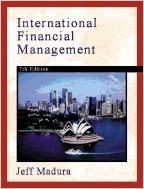Answered step by step
Verified Expert Solution
Question
1 Approved Answer
Background: You are the supervisor of a National Forest district in the Pacific Northwest. Your task is to develop a long - term management plan
Background:
You are the supervisor of a National Forest district in the Pacific Northwest. Your task is to develop a longterm management plan for this district. Your general objective is to maintain a diverse forest landscape in order to protect the forest against epidemics and fires, to provide habitat for varied wildlife, and for aesthetic reasons. However, you must report on the economic implications of any management plan you suggest.
The property consists of a mosaic of evenaged stands of Douglasfir, of which a large part is old growth. The stands are classified in age classes of years each. When part of a stand is cut, reforestation follows immediately by planting whatever area was cut with oneyearold seedlings. The price of timber is $Mbf the cost of reforestation is $ per acre, and the interest rate is percent per year.
The yield per acre of a stand, Yi depends only on its ageclass, i as shown in column B The initial forest state is shown column C At the beginning of period there are acres in age class trees aged to years acres in age class and so on up to acres in age class trees years old and older; there is no upper age limit for trees in age class
You will design a management plan over the next years p periods of years each This plan is defined by the area cut in each age class in each period Xij To begin, you plan on cutting of the total forest area in each year period, preferentially cutting from the oldest age classes. You will then explore other management plans that depend on the objectives you set.
Manual Solution
Task
Download the Lab Planning Landscape Diversity Template.xlsx file from Bcourses. Rename the template file to reflect your work.
Begin by relating the stock and cut tables with formulas, such that the stock in period j is a function of the stock in period j and the cut in period j You may wish to populate the cut table with dummy initial values to allow you to check your work visually. Ultimately, you should populate formulas to complete the cut plan up until period that is after years Dont forget that with each sequential management period, your forest ages!
You should also fill out other cells in the spreadsheet with a combination of the information youve been given and formulas that yield the computations you need.
D years per management period
R interest rate
Price
Reforestation cost
Totals acres of stock area, acres cut, and Mbf produced
Hint: the SUMPRODUCT function can be helpful for calculating the MBF you harvest in each period.
Create a lab report in word processing software eg Microsoft Word using the template provided. Copy and explain the formulas you used into your lab report.
Task
Design a cutting plan for the whole year period in which you cut of the acreage in any given management period. Fill in the cut table for periods : with values and formulas to achieve steady state by period When a forest is in steady state, the acreage in any given age class should not change from one period to the next after a cut, stock, and aging cycle ie two adjacent columns are identical
Paste a screenshot of your stock and cut tables into your lab report. How does your management plan score in terms of forest diversity? You can describe this quantitatively or qualitatively. What would a diverse forest
look like in the formulation of this problem?
Task
Complete the spreadsheet by entering formulas to compute:
The gross benefit achieved from timber sales Benef the gross reforestation cost Cost and the net benefit in each period Net
The present value of the net benefits in each period up to the steady state. Calculating the present value of a future benefit requires that you convert the future benefit from future dollars to currentday dollars using the interest rate and time elapsed. Well talk more about this later in the
semester, but for now, you can use this formula:
V Vn in
Where:
V is the value expressed in presentday dollars
Vn is the value expressed in future dollars
i is the interest rate, expressed as a decimal
n is the number of years between present and future
The present value of the net benefits of all rotations after the steady state has been reached:
VNeti iD iD
Where:
V is the value expressed in presentday dollars
Net i is the net value of benefits and costs for the fifth period, expressed in future dollars
i is the interest rate, expressed as a decimal
D is the duration of a management period
The forest value FV sum of NPV of all time periods
Copy and describe the formulas you used to calculate each of these values in your lab report.

Step by Step Solution
There are 3 Steps involved in it
Step: 1

Get Instant Access to Expert-Tailored Solutions
See step-by-step solutions with expert insights and AI powered tools for academic success
Step: 2

Step: 3

Ace Your Homework with AI
Get the answers you need in no time with our AI-driven, step-by-step assistance
Get Started


